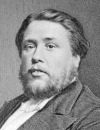The Lord's Prayer
interpretation by Alexander Maclaren - part 2
II. A type of prayer is not all that we need. The spirit in which we pray is still more important. So Jesus goes on to enjoin two things chiefly; namely, persistence and filial confidence. He presents to us a parable with its application (vs. 5-10), and the germ of a parable with its (vs. 11-13). Observe that these two parts deal with encouragements to confidence drawn, first, from our own experience in asking, and, second, with encouragements drawn from our own experience in giving. In the former we learn from the man who will not take ‘no,’ and so at last gets ‘yes’; in the latter, from the Father who will certainly give His child what he asks.
In the parable two points are to be specially noted—the persistent suppliant pleads not for himself so much as for the hungry traveller, and the man addressed gives without any kindliness, from the mere wish to be left at peace. As to both points, an a fortiori argument is implied. If a man can so persevere when pleading for another, how much more should we do so when asking for ourselves! And if persistence has such power with selfish men, how much more shall it avail with Him who slumbers not nor sleeps, and to whom we can never come at an inopportune moment, and who will give us because we are His friends, and He ours! The very ugliness of character ascribed to the owner of the loaves, selfish in his enjoyment of his bed, in his refusal to turn out on an errand of neighbourliness, and in his final giving, thus serves as a foil to the character of Him to whom our prayers are addressed.
The application of the parable lies in verses 9 and 10 . The efforts enjoined are in an ascending scale, and ‘ask’ and ‘knock’ allude to the parable. To ‘seek’ is more than to ask, for it includes active exertion; and for want of seeking by conduct appropriate to our prayers, we often ask in vain. If we pray for temporal blessings, and then fold our hands, and sit with our mouths open for them to drop into, we shall not get them. If we ask for higher goods, and rise from our knees to live worldly lives, we shall get them as little. Knocking is more than either, for it implies a continuous hammering on the door, like Peter’s when he stood in the morning twilight at Mary’s gate. Asking and seeking must be continuous if they are to be rewarded.
Verse 10 grounds the promise of verse 9 on experience. It is he who asks that gets. In men’s giving it is not universally true that petitions are answered, nor that gifts are not given unasked. Nor is it true about God’s lower gifts, which are often bestowed on the unthankful, and not seldom refused to His children. But it is universally true in regard to His highest gifts, which are never withheld from the earnest asker who adds to his prayers fitting conduct, and prays always without fainting, and which are not and cannot be given unless desire for them opens the heart for their reception, and faith in God assures him who prays that he cannot ask in vain.
The germ of a parable with its application (vs. 11-13) draws encouragement from our own experience in giving. It guards against misconceptions of God which might arise from the former parable, and comes back to the first word of the Lord’s Prayer as itself the guarantee of every true desire of His child being heard and met. Bread, eggs, and fish are staple articles of food. In each case something similar in appearance, but useless or hurtful, is contrasted with the thing asked by the child. The round loaves of the East are not unlike rounded, wave-washed stones, water-serpents are fishlike, and the oval body of a quiescent scorpion is similar to an egg. Fathers do not play tricks with their hungry children. Though we are all sinful, parental love survives, and makes a father wise enough to know what will nourish and what would poison his child.
Alas! that is only partially true, for many a parent has not a father’s heart, and is neither impelled by love to give good things to, nor to withhold evil ones from, his child. But it is true with sufficient frequency to warrant the great a fortiori argument which Jesus bases on it. Our heavenly Father’s love, the archetype of all parental affection, is tainted by no evil and darkened by no ignorance. He loves perfectly and wisely, therefore He cannot but give what His child needs.
But the child often mistakes, and thinks that stones are bread, serpents fish, and scorpions eggs. So God often has to deny the letter of our petitions, in order not to give us poison. Luke’s version of the closing promise, in which ‘the Holy Spirit’ stands instead of Matthew’s ‘good things,’ sets the whole matter in the true light; for that Spirit brings with Him all real good, and, while many of our desires have, for our own sakes, to be denied, we shall never hold up empty hands and have to let them fall still empty, if we desire that great encyclopediacal gift which our loving Father waits to bestow. It cannot be given without our petition, it will never be withheld from our petition.
Alexander Maclaren (1826-1910) - Expositions of Holy Scripture: Luke

About the writers here
 John Calvin (1507-1564) was part of the reformation movement of the sixteenth century. His most notable theological stance is the belief that God is sovereign in the matters of salvation and election.
John Calvin (1507-1564) was part of the reformation movement of the sixteenth century. His most notable theological stance is the belief that God is sovereign in the matters of salvation and election.
Alexander Maclaren (1826-1910) was a English Baptist minister. He is most famous for his expository style, drawing on examples from life and nature to develop biblical truths. The commentaries in this section are taken from his writings on the version of the Lord's prayer in Luke's Gospel.
 Charles Haddon Spurgeon (1834-92) is one of the most famous preachers of the nineteenth century. The two sermons found in this section record some fascinating insights into the Lord's prayer.
Charles Haddon Spurgeon (1834-92) is one of the most famous preachers of the nineteenth century. The two sermons found in this section record some fascinating insights into the Lord's prayer.
 John Wesley (born 1703, died aged 87 in 1791) is the founder of the modern day Methodist movement. His most famous theological insight is "Christian Perfection", a belief that the love of God can reign supreme in the believers heart.
John Wesley (born 1703, died aged 87 in 1791) is the founder of the modern day Methodist movement. His most famous theological insight is "Christian Perfection", a belief that the love of God can reign supreme in the believers heart.
find out more about the Lord's Prayer in our Line-by-line commentary section
